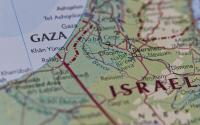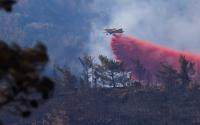 US and Iraqi troops have launched a major security push in Baghdad |
Speaking to Congress, Mr Gates said the deployment would be in addition to the nearly 24,000 combat troops and support personnel approved by President Bush.
The extra forces will help deal with an anticipated increase in detainees during the Baghdad security crackdown.
Top US military commander in Iraq, Lt Gen David Petraeus, made the request.
"That's a new requirement by a new commander," said Mr Gates of Gen Petraeus, who assumed command last month, ahead of a fresh push to quell violence in Baghdad.
'Positive signs'
Mr Gates also said he was not surprised that Sunni insurgents have launched increased attacks in recent days.
"I think that we expected that there would be in the short-term an increase in violence as the surge began to make itself felt," Mr Gates said, adding there were other "very preliminary positive signs" the security plan was working.
 The success of Bush's strategy rests with Lt Gen Petraeus |
The new offensive involves US and Iraqi forces, thousands of whom are already on the ground, sweeping Baghdad for militants and illegally held weapons, US military officials say.
Gen Petraeus is overseeing the deployment of more American troops because of the failure so far of Iraqi units to deal with the sectarian violence.
The violence between Sunni and Shia Muslims flared after an attack on a key Shia shrine in Samarra just over a year ago
The New York Times quoted one of Gen Petraeus's key commanders, Lt Gen Raymond Odierno, as saying the higher troop levels should remain until February 2008.
The BBC's James Westhead says the new troop allocation will set nerves jangling in Washington.
Already Democrats have tried unsuccessfully to block what they see as an escalation of the war in Iraq and this will only fuel the already tense debate, our correspondent says.
Congressional sources on Wednesday said Democrats were planning to propose legislation requiring US troops to return from Iraq by the second half of next year or sooner if Iraq's government failed to meet security goals.
The legislation could be tied to the $100bn ($52bn) funding request by the Bush administration for the Iraq and Afghanistan operations, the sources said.
The law would mark the biggest flexing of muscle by the Democrats since they took both houses of Congress in November.






